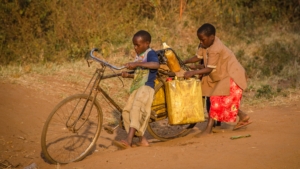Buffalo Bicycles Reduce Poverty in Africa
 The World Bicycle Relief program, a Chicago-based nonprofit organization that came about in 2005, is aiding people in impoverished rural areas around the world by donating specially designed resilient bicycles that can handle the rough terrain in rural areas. With women and girls at the focus of the program, these bicycles provide a much-needed transportation service in countries where access to health care, education and other opportunities are impacted by access to transportation.
The World Bicycle Relief program, a Chicago-based nonprofit organization that came about in 2005, is aiding people in impoverished rural areas around the world by donating specially designed resilient bicycles that can handle the rough terrain in rural areas. With women and girls at the focus of the program, these bicycles provide a much-needed transportation service in countries where access to health care, education and other opportunities are impacted by access to transportation.
Buffalo Bicycles
The specially designed Buffalo bicycles are made of steel and feature puncture-resistant tires to handle long distances and irritable climates. The bicycles can also carry a load of up to 200kg.
With a goal of reaching 5 million people with bicycles by 2025, World Bicycle Relief works with governments, companies and collaborators to “implement impactful, cost-effective, holistic bicycle mobility programs that are community-led and managed, Wobased on an evidence-based approach and with gender intentionality,” the organization says. Since its founding in 2005, the organization has helped 681,000 people pedal away from poverty in Africa.
Access to education is crucial in the fight against poverty, and in Africa one in three adults cannot read, leaving 48 million aged 15–24 illiterate, according to a 2020 study by the World Bank. Thirty-three million children (22%) do not attend school of any kind — 74% of children aged 5–9. This is why these bicycles are changing women’s lives in Africa by allowing them to travel through tough terrains and handle heavy loads for long distances. Poverty in Africa also forces citizens to walk long distances for essential resources such as water, but with the Buffalo Bicycle, they are able to transport essential items home in an easy and safe manner.
Female Empowerment
Only 30% of the organization’s programming covers men, as World Bicycle Relief realizes the far-reaching impact of empowering girls and women in order to shape futures and reduce poverty.
For instance, the Buffalo bicycle allows girls to travel to school easily. As education is a proven pathway out of poverty, World Bicycle Relief helps girls break cycles of poverty by giving them a means of transport to attend school.
According to the World Bank, “Educated females may strengthen national economies by entering the workforce and, with a secondary education, earn more money to help raise themselves and their families out of poverty.” In general, research proves that the empowerment of girls and women plays a significant role in poverty reduction. As such, efforts to address poverty are ineffective unless initiatives are female-focused.
A study done in Zambia found that providing girls with Buffalo bicycles increased punctuality, reduced absences by 28%, led to higher test scores and increased safe passage from harassment by 22%, in addition to saving them roughly an hour a day that they would normally spend on walking.
Since 2013, the Zambian Ministry of Education and the World Bicycle Relief have worked together to “Help 36,977 rural girls get to school quickly and safely with specially designed bicycles,” according to the United Nations. The United States Agency for International Development also assisted in October 2021 by creating grants to aid access to bicycles in an attempt to fight poverty in Africa. Empowering girls and women to access essential resources and critical services, like education and health care, through the provision of basic transportation helps to improve their quality of life.
Final Thoughts
When the only option for getting anywhere is to walk through dangerous areas in unrelenting climates, the need for easy and no-cost transportation changes the lives of those living in these impoverished regions. This allows women and children to take the reins of their own futures and improve the quality of life — not only for themselves but for future generations as well.
– Jennifer Arias
Photo: Unsplash
